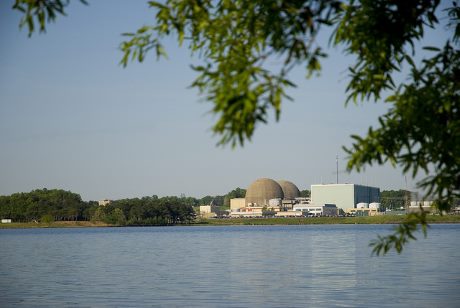Dominion Energy Virginia yesterday notified the US Nuclear Regulatory Commission (NRC) that it intends to relicense the North Anna nuclear power plant for a second time, as part of its strategy to maintain lower carbon emissions in Virginia. The additional 20-year term would give North Anna's two reactors an operating period of up to 80 years.
 |
| North Anna (Image: NRC/Dominion Energy) |
The company informed the NRC that it expects to file the licence renewal application in 2020. It previously notified the regulator in 2015 that it would file a similar application to renew the licences of its two-unit Surry plant, also in Virginia, in 2019. The filing of a letter of intent is necessary to enable the NRC to plan its staffing needs to support the renewal process.
Daniel Stoddard, chief nuclear officer for Dominion's nuclear generation division, said renewing North Anna's licence for a second 20-year period was "the right thing to do" for customers, the regional economy and the environment.
"The planned relicensing of North Anna and Surry ensures that the benefits of these clean energy sources will continue to provide affordable, reliable, carbon-free electricity to our customers through the middle of the century. Our nuclear power stations have proven to be among the most efficient and most reliable sources of electricity in our fleet," he said.
The company said its review of technical aspects associated with the North Anna licence renewal application is not yet complete, but it sees "no significant barriers" that would prevent a 2020 submittal. It plans to invest up to $4 billion on upgrades to both North Anna and Surry as part of the relicensing process.
Stoddard also said the continued operation of North Anna and Surry would "go a long way" towards meeting and maintaining both federal and state goals for lowering carbon emissions in Virginia. Governor Terry McAuliffe in May signed an order instructing the Virginia Department of Environmental Quality to begin the process of establishing regulations to reduce carbon emissions from power plants, and the department's Air Pollution Control Board is due this month to discuss a draft regulation to reduce greenhouse gases from electricity generation.
Both North Anna and Surry are home to two pressurised water reactors. North Anna 1 entered commercial operation in 1978, and North Anna 2 in 1980, with Surry 1 entering commercial operation in 1972 and Surry 2 in 1973. Like all US nuclear power reactors, the units were originally licensed to operate for 40 years. All four units received 20-year licence renewals in 2003, following a review process that took nearly two years to complete.
North Anna 1 and 2 are currently licensed until 2038 and 2040, respectively, with Surry 1 and 2 licensed until 2032 and 2033. The second 20-year renewal would allow North Anna 1 and 2 to operate until 2058 and 2060, and Surry 1 and 2 until 2052 and 2053.
Dominion Energy Virginia is a unit of Dominion Energy Inc. Dominion Energy also operates two nuclear units at Millstone in Connecticut, which received a 20-year licence renewal in 2005. The company said it may consider a second 20-year renewed licence for the plant, but has not as yet made an decision to do so. Millstone 2 is currently licensed until 2035 and Millstone 3 until 2045.
The NRC has to date issued a total of 89 licence renewals to US nuclear power reactors, including three plants - Fort Calhoun, Kewaunee and Vermont Yankee - which have since permanently shut down. Eleven US reactors are still operating under their original licences. Of these, the NRC is currently considering licence renewal applications for seven units, and expects to receive applications for the remaining four from 2020 onwards.
Researched and written
by World Nuclear News







_97013.jpg)






